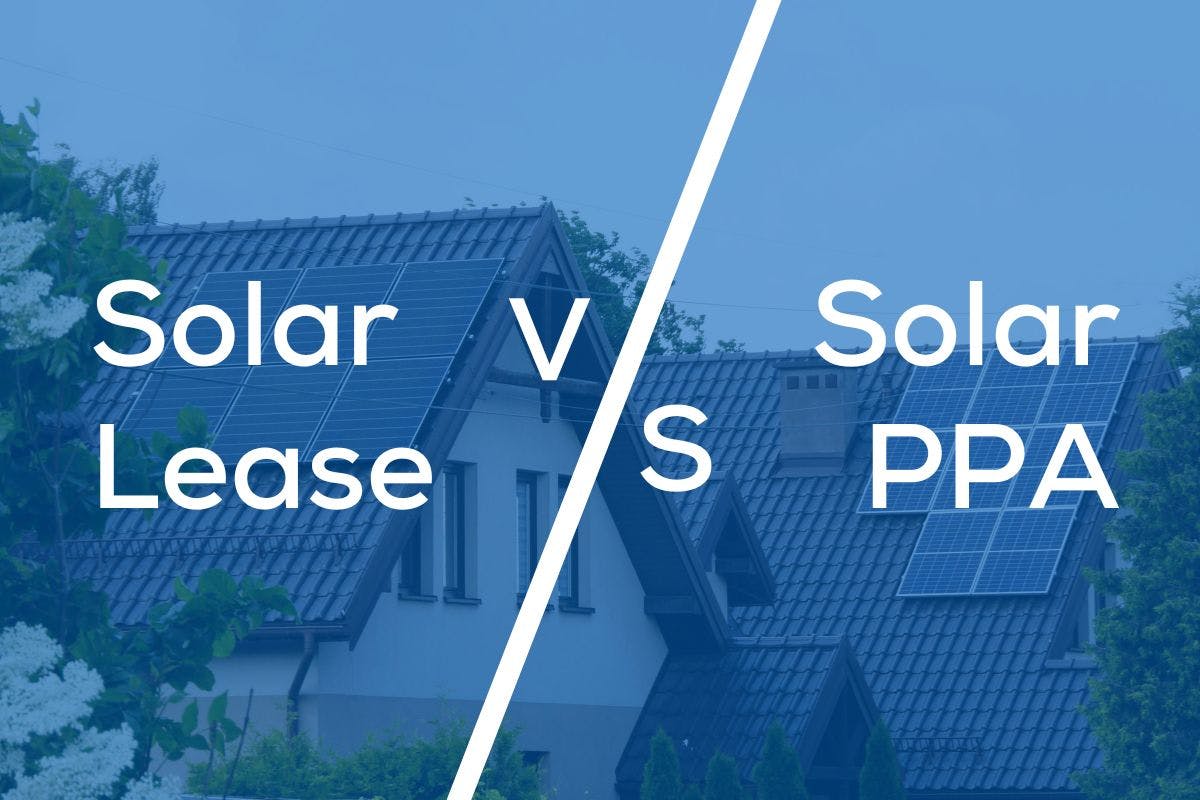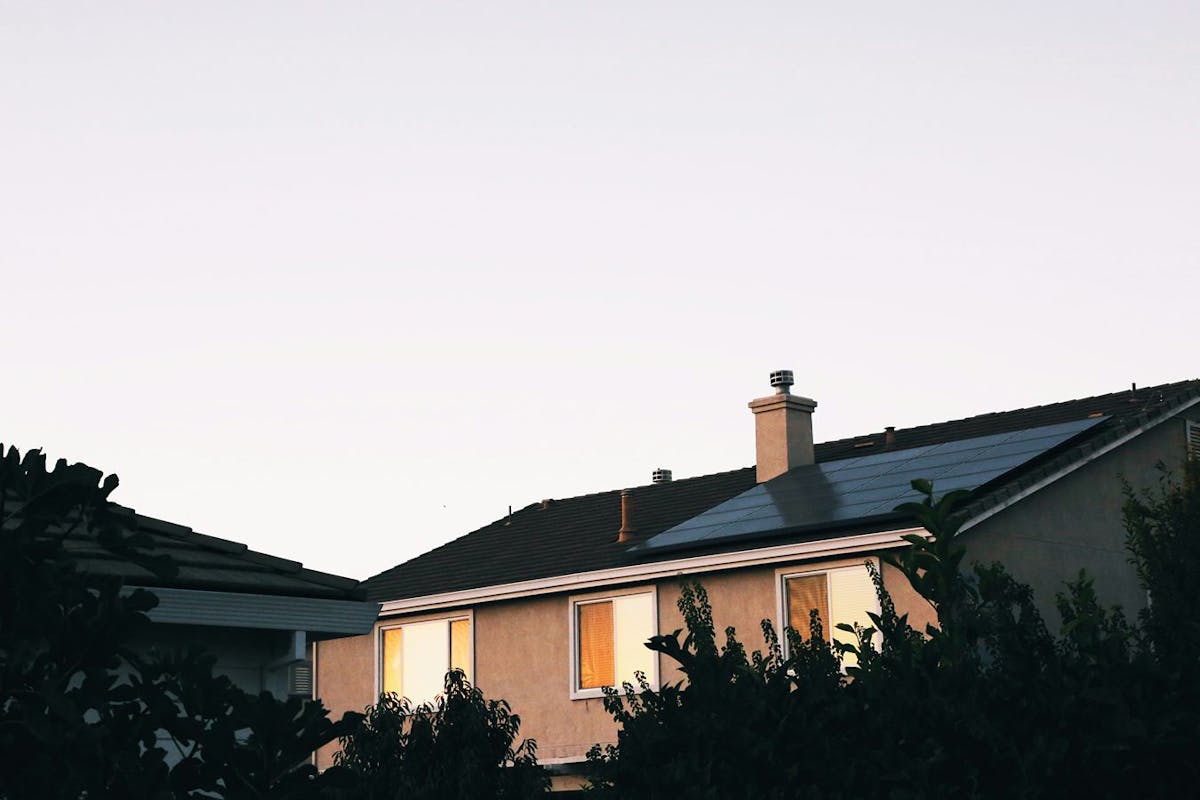Solar Leases vs. PPAs: Understanding the Difference
Last edited
Author
Andrew Giermak
Solar and Electrification Writer and Editor
Editor
Andrew Blok
Electrification and Solar Writer and Editor

Powering your home and saving money with clean solar energy can save you money and lower your bills. But if the cost to purchase and install home solar panels feels too high it’s still possible to start with solar power at home. A solar lease or solar power purchase agreement may be the way to saving with clean power.
Before signing a long-term contract, it’s important to know the details and have all the answers you need. In this guide, we cover how to go solar with solar leases and solar power PPAs.
See how much you can save by going solar with Palmetto
How Solar Leases Work
When you go solar with a solar lease, you don’t purchase the solar panels. Instead you make predictable monthly payments for the solar equipment installed at your home.
Solar leases are structured to deliver energy bill savings that exceed the cost of ongoing lease payments. As high-quality solar panels can generate power for two decades and more, a typical lease agreement is 25 years.
Solar leases typically include an annual escalator, which increases monthly payments by a fixed percentage each year. Throughout the operating lifetime of a solar lease, the system’s owner, not you, maintains responsibility for any upkeep or required maintenance and the system's eventual decommissioning.
Benefits of a solar lease
- Immediate savings on electricity bills, with predictable monthly payments
- No large purchase or loan required, avoiding interest paid on solar loans
- You have clean solar power for your home
- Ongoing monitoring and maintenance included within the agreement
- Option to buy system after a few years
Drawbacks of a solar lease
- Typically lower lifetime savings versus solar panel ownership, especially if you qualify for tax credits
- Long contract terms with slowly escalating monthly payments
- Lease transfer may be necessary when selling your home
How Solar PPAs Work
Like a lease, a solar power purchase agreement enables energy savings without requiring system ownership. While monthly lease payments are for the equipment, in a solar power PPA, you pay for the solar energy produced.
In a power purchase agreement, your monthly payment will reflect the kilowatt-hours (kWh) of solar energy your panels produce. The electricity rates you pay for the solar energy from your roof are designed to be lower than what you’d pay for the electricity from your utility that it offsets. Some PPAs may look like leases with fixed monthly payments.
Like solar lease agreements, most PPAs are a 10 to 25-year commitment, and you should carefully weigh the pros and cons before proceeding with any project.
Benefits of solar PPAs
- Easy use of renewable solar power at home
- No large purchase or loan, or added interest
- Maintenance and system monitoring are included
- Rates that start lower than grid electricity for ongoing cost savings
- Only paying for solar energy produced, rather than a fixed price for the system each month
Drawbacks of solar PPAs
- Fluctuating payments, which usually include an annual price escalator
- You could pay more in months with higher solar production.
- Added considerations during home sales and system transfers
Comparing Solar Leases and PPAs
Both leases and PPAs can be worthwhile renewable energy projects for homeowners looking to save money on immediate and long-term electricity costs.
Practically, these options are best for those who do not want to invest in solar ownership, cannot take advantage of the federal solar tax incentive, or seek a worry-free option with maintenance and care included.
Head-to-head, here is how a power purchase agreement and a solar lease stack up against one another financially.
Upfront costs: None likely for either contract
Most solar PPAs and leases are signed with zero upfront costs, meaning the solar company will design and install your system without any out-of-pocket expenses.
In rare cases, you may be able to make a down payment on your solar lease or power purchase agreement to lock in even lower prices throughout your contract.
Ongoing expenses: Flat vs. variable payments
The key difference between a solar lease and a PPA is how your ongoing energy expenses will be calculated. With a lease, you pay a flat monthly rate for all of the power your panels produce, whereas with a PPA you pay for the exact quantity of solar electricity generated.
In both scenarios, you will likely pay slightly more for your solar power each consecutive year, with a fixed percentage increase every 12 months. This escalator is designed to remain below utility prices for the duration of your agreement, as illustrated in the chart from the National Renewable Energy Laboratory below.

Ongoing maintenance: Included in the best agreements
Although solar systems require very little ongoing maintenance, small bits of upkeep may pop up during the 20 years or more of a PPA or lease agreement. In both agreements, the solar company or a third-party developer will typically monitor your system's performance remotely and take action to remedy any damages, malfunctions, or losses in power.
Before signing your PPA or lease, it is essential to fully understand what will be covered when things go wrong. In the best-case scenario, your PPA or lease agreement will include every part replacement or labor required without any future out-of-pocket costs.
See how much you can save by going solar with Palmetto
End of agreement processes: Varies by provider
Solar leases and PPAs have similar end-of-agreement processes, though terms and options vary by project owner. In some instances, you may be able to extend the terms of your agreement, buy the system outright, or simply let the contract run its course. At the end of most PPAs and leases, the developer will be on the hook to remove the system from your property without additional fees.
Property value and property taxes: Unchanged in both
Unlike when you buy a solar energy system, panels installed using a lease or PPA are less likely to increase your property value. While a purchased system would be considered an asset, panels associated with ongoing payments may not increase the value of your home for a sale or property tax assessment. The added value of a solar energy system is exempt from property taxes in 36 states.
Note: This content is for educational purposes only. Palmetto does not provide tax, legal, or accounting advice. Please consult your own tax, legal, and accounting advisors.
Performance guarantees: Varies by project owner
Premium PPAs and solar leases (like the Palmetto LightReach Energy Program) often include performance guarantees to ensure your system's electric output delivers as advertised. With such a guarantee, you can be credited or compensated directly for any reduced savings from underperforming panels or broken system components.
LightReach customers are automatically enrolled in Palmetto Protect, which guarantees system performance up to 90% of expected annual power generation.
Making the Right Choice for Your Home
Your state might dictate whether a lease or PPA is available where you live. If you have decided third-party solar ownership is best for you, it’s wise to ask your installer some questions before moving ahead.
It’s also important to understand your home's energy use and expenses, both now and in the future. While electricity consumption is always variable, home additions, appliance upgrades, EV purchases, and changes in the number of residents can significantly change energy usage.

What to ask your future solar provider
Solar leases or PPAs are long-term agreements, and you want to understand the details and how your installer will handle them before entering into a contract. To help you make the best decision for your home, here are questions you can ask potential lessors or PPA project owners to guarantee your solar array is the real deal.
- What is the duration of the agreement? Are there multiple options?
- How much will my payments be?
- Is there an annual price escalator?
- What is the project timeline?
- Are there any upfront or hidden costs I should be worried about?
- What happens if my panels stop working or don't work as expected?
- If I need to relocate, can I terminate or transfer the agreement?
- How will the solar installation affect my home insurance policy?
- Will my payments be fixed or vary with the system’s production?
- What happens at the end of the solar lease?
- Can I buy out my solar panels during or at the end of my contract?

Ultimately, solar leases and solar PPAs are designed to do the same thing: save you money with renewable energy at home. Before signing a 10- to 25-year agreement, it is important to fully understand how your solar PPA or lease is going to work, including the financial implications.
To explore options tailored to your energy needs, you can contact a Palmetto solar energy expert today. Or you can start with our solar savings calculator to get an estimate of your savings.
See what solar can do for you:
Frequently Asked Questions
Can you get out of a solar lease or PPA?
This is a potential downside of a solar lease or solar PPA. It can be difficult and costly to get out of a lease or PPA. The contract is usually 10-25 years with options such as the ability to buy the system after a period of time in the contract. Discuss your options with your lease or PPA company before moving ahead.
What is the difference between a solar lease and a PPA?
The main difference between a lease and a PPA is, in a lease, you’ll pay a flat fee for the equipment installed. In a PPA, you’ll pay for the electricity the panels generate.
Can a solar lease save you money?
A solar lease can save you money on what you’d pay your utility company for fully using utility power instead of the solar power from the leased system.



